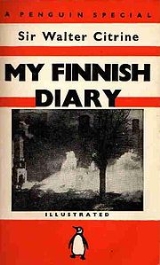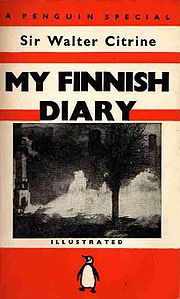
Walter Citrine, 1st Baron Citrine
Encyclopedia
Walter McLennan Citrine, 1st Baron Citrine, GBE
, PC
(22 August 1887, Wallasey
— 22 January 1983, Brixham
) was a British trade unionist and politician.
An electrician by trade, he became Mersey
District's secretary of his trade union, the Electrical Trades Union
, in 1914. Twelve years later he became General Secretary
of the Trade Union Congress, holding the post for twenty years, including through World War II
. He was also president of the International Confederation of Free Trade Unions
1928-45 and president of the World Trade Union Conference in 1945.
Citrine strengthened the TUC's influence over the Labour Party
. He opposed plans by the Labour Government in 1931 to cut unemployment benefits and as a result led the campaign to have Ramsay MacDonald
expelled from the party. He supported Clement Attlee
's government's policy of nationalisation and served on the National Coal Board
and served as chairman of the Central Electricity Board
1947-57. He was granted a peerage in 1947.
He authored The ABC of Chairmanship, regarded by many in the labour movement as the "bible" of committee chairmanship. His autobiography Men and Work was published in 1964. His personal papers are held at the London School of Economics
.

between Citrine and French Labour Minister
Charles Pomaret, the latter "clamped down on French labour with a set of drastic wage-&-hour decrees and Sir Walter Citrine agreed to a proposal by Chancellor of the Exchequer Sir John Simon
that pay rises in Britain be stopped" This brought condemnation from the communist newspaper The Morning Star
, then called the Daily Worker.
Citrine sued the Daily Worker for libel after it accused him and his associates of "plotting with the French Citrines to bring millions of Anglo-French Trade Unionists behind the Anglo-French imperialist war machine"; the publisher pleaded the British press equivalent of 'fair comment
'. Citrine alleged, in response to his lawyer's questioning, that the Daily Worker received £2000 pounds per month from "Moscow", and that Moscow directed the paper to print anti-war stories.
The Daily Workers counsel, Denis Nowell Pritt
, asked Citrine "Have you ever considered ... whether there is any alternative to carrying on this war to a bitter conclusion?" Replied Citrine: "The alternative is to capitulate to Hitler and lose our freedom."
at the height of the Winter War
as a part of a British Labour delegation, leaving Britain on 21 January 1940 and returning on 8 February 1940. He interviewed many people ranging from General Mannerheim
to Russian prisoners. He visited the front line near the Summa sector of the Mannerheim line
. He wrote a popular account of his brief visit in My Finnish Diary.
Order of the British Empire
The Most Excellent Order of the British Empire is an order of chivalry established on 4 June 1917 by George V of the United Kingdom. The Order comprises five classes in civil and military divisions...
, PC
Privy Council of the United Kingdom
Her Majesty's Most Honourable Privy Council, usually known simply as the Privy Council, is a formal body of advisers to the Sovereign in the United Kingdom...
(22 August 1887, Wallasey
Wallasey
Wallasey is a town within the Metropolitan Borough of Wirral, in Merseyside, England, on the mouth of the River Mersey, at the northeastern corner of the Wirral Peninsula...
— 22 January 1983, Brixham
Brixham
Brixham is a small fishing town and civil parish in the county of Devon, in the south-west of England. Brixham is at the southern end of Torbay, across the bay from Torquay, and is a fishing port. Fishing and tourism are its major industries. At the time of the 2001 census it had a population of...
) was a British trade unionist and politician.
An electrician by trade, he became Mersey
Mersey
Mersey may refer to:* River Mersey, in northwest England* Mersea Island, off the coast of Essex in England * Mersey River in the Australian state* Electoral division of Mersey in the state of Tasmania, Australian...
District's secretary of his trade union, the Electrical Trades Union
Electrical, Electronic, Telecommunications and Plumbing Union
The Electrical, Electronic, Telecommunications and Plumbing Union, known as the EETPU was a British trade union formed in 1968 as a union for electricians.-History:...
, in 1914. Twelve years later he became General Secretary
General Secretary of the TUC
The General Secretary of the TUC is the chief permanent officer of the Trades Union Congress, and a major figurehead in the trade union movement in the United Kingdom....
of the Trade Union Congress, holding the post for twenty years, including through World War II
World War II
World War II, or the Second World War , was a global conflict lasting from 1939 to 1945, involving most of the world's nations—including all of the great powers—eventually forming two opposing military alliances: the Allies and the Axis...
. He was also president of the International Confederation of Free Trade Unions
International Confederation of Free Trade Unions
The International Confederation of Free Trade Unions was an international trade union. It came into being on 7 December 1949 following a split within the World Federation of Trade Unions , and was dissolved on 31 October 2006 when it merged with the World Confederation of Labour to form the...
1928-45 and president of the World Trade Union Conference in 1945.
Citrine strengthened the TUC's influence over the Labour Party
Labour Party (UK)
The Labour Party is a centre-left democratic socialist party in the United Kingdom. It surpassed the Liberal Party in general elections during the early 1920s, forming minority governments under Ramsay MacDonald in 1924 and 1929-1931. The party was in a wartime coalition from 1940 to 1945, after...
. He opposed plans by the Labour Government in 1931 to cut unemployment benefits and as a result led the campaign to have Ramsay MacDonald
Ramsay MacDonald
James Ramsay MacDonald, PC, FRS was a British politician who was the first ever Labour Prime Minister, leading a minority government for two terms....
expelled from the party. He supported Clement Attlee
Clement Attlee
Clement Richard Attlee, 1st Earl Attlee, KG, OM, CH, PC, FRS was a British Labour politician who served as the Prime Minister of the United Kingdom from 1945 to 1951, and as the Leader of the Labour Party from 1935 to 1955...
's government's policy of nationalisation and served on the National Coal Board
National Coal Board
The National Coal Board was the statutory corporation created to run the nationalised coal mining industry in the United Kingdom. Set up under the Coal Industry Nationalisation Act 1946, it took over the mines on "vesting day", 1 January 1947...
and served as chairman of the Central Electricity Board
Central Electricity Board
The United Kingdom Central Electricity Board was set up under The Electricity Act 1926 to standardise the nation's electricity supply. At that time, the industry consisted of more than 600 electricity supply companies and local authority undertakings, and different areas operated at different...
1947-57. He was granted a peerage in 1947.
He authored The ABC of Chairmanship, regarded by many in the labour movement as the "bible" of committee chairmanship. His autobiography Men and Work was published in 1964. His personal papers are held at the London School of Economics
London School of Economics
The London School of Economics and Political Science is a public research university specialised in the social sciences located in London, United Kingdom, and a constituent college of the federal University of London...
.
World War II

Policies during WWII
After a December 1939 meeting in ParisParis
Paris is the capital and largest city in France, situated on the river Seine, in northern France, at the heart of the Île-de-France region...
between Citrine and French Labour Minister
Minister of Social Affairs (France)
The Minister of Social Affairs and Employment The Minister of Social Affairs and Employment The Minister of Social Affairs and Employment (French: Ministre des Affaires sociales et de l'emploi is a cabinet member in the Government of France. The position was originally known as Minister of Labor...
Charles Pomaret, the latter "clamped down on French labour with a set of drastic wage-&-hour decrees and Sir Walter Citrine agreed to a proposal by Chancellor of the Exchequer Sir John Simon
John Simon, 1st Viscount Simon
John Allsebrook Simon, 1st Viscount Simon GCSI GCVO OBE PC was a British politician who held senior Cabinet posts from the beginning of the First World War to the end of the Second. He is one of only three people to have served as Home Secretary, Foreign Secretary and Chancellor of the Exchequer,...
that pay rises in Britain be stopped" This brought condemnation from the communist newspaper The Morning Star
The Morning Star
The Morning Star is a left wing British daily tabloid newspaper with a focus on social and trade union issues. Articles and comment columns are contributed by writers from socialist, social democratic, green and religious perspectives....
, then called the Daily Worker.
Citrine sued the Daily Worker for libel after it accused him and his associates of "plotting with the French Citrines to bring millions of Anglo-French Trade Unionists behind the Anglo-French imperialist war machine"; the publisher pleaded the British press equivalent of 'fair comment
Fair comment
Fair comment is a legal term for a common law defense in defamation cases .-United States:In the United States, the traditional privilege of "fair comment" is seen as a protection for robust, even outrageous published or spoken opinions about public officials and public figures...
'. Citrine alleged, in response to his lawyer's questioning, that the Daily Worker received £2000 pounds per month from "Moscow", and that Moscow directed the paper to print anti-war stories.
The Daily Workers counsel, Denis Nowell Pritt
Denis Nowell Pritt
Denis Nowell Pritt , usually known as D.N. Pritt, was a British barrister and Labour Party politician. Born in Harlesden, Middlesex, he was educated at Winchester College and London University....
, asked Citrine "Have you ever considered ... whether there is any alternative to carrying on this war to a bitter conclusion?" Replied Citrine: "The alternative is to capitulate to Hitler and lose our freedom."
Finland
He visited FinlandFinland
Finland , officially the Republic of Finland, is a Nordic country situated in the Fennoscandian region of Northern Europe. It is bordered by Sweden in the west, Norway in the north and Russia in the east, while Estonia lies to its south across the Gulf of Finland.Around 5.4 million people reside...
at the height of the Winter War
Winter War
The Winter War was a military conflict between the Soviet Union and Finland. It began with a Soviet offensive on 30 November 1939 – three months after the start of World War II and the Soviet invasion of Poland – and ended on 13 March 1940 with the Moscow Peace Treaty...
as a part of a British Labour delegation, leaving Britain on 21 January 1940 and returning on 8 February 1940. He interviewed many people ranging from General Mannerheim
Carl Gustaf Emil Mannerheim
Baron Carl Gustaf Emil Mannerheim was the military leader of the Whites in the Finnish Civil War, Commander-in-Chief of Finland's Defence Forces during World War II, Marshal of Finland, and a Finnish statesman. He was Regent of Finland and the sixth President of Finland...
to Russian prisoners. He visited the front line near the Summa sector of the Mannerheim line
Mannerheim Line
The Mannerheim Line was a defensive fortification line on the Karelian Isthmus built by Finland against the Soviet Union. During the Winter War it became known as the Mannerheim Line, after Field Marshal Baron Carl Gustaf Emil Mannerheim. The line was constructed in two phases: 1920–1924 and...
. He wrote a popular account of his brief visit in My Finnish Diary.

